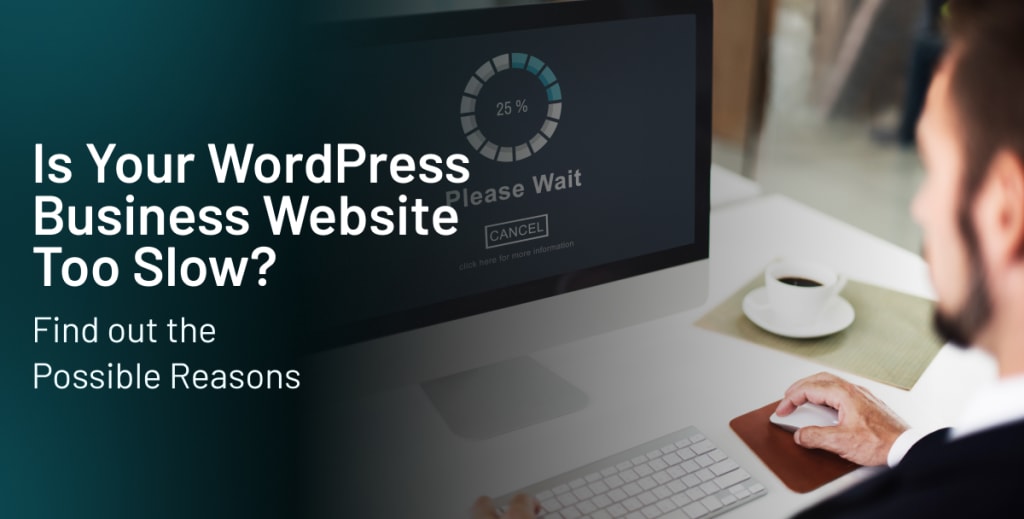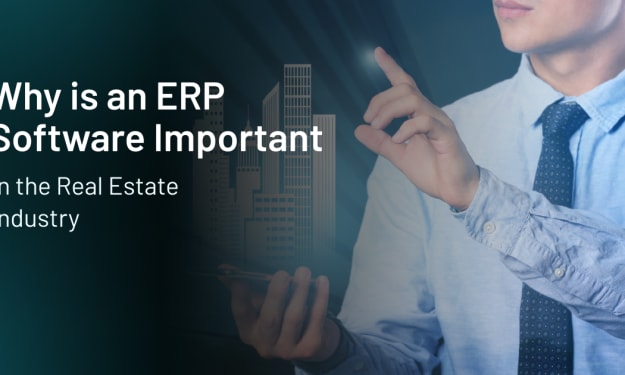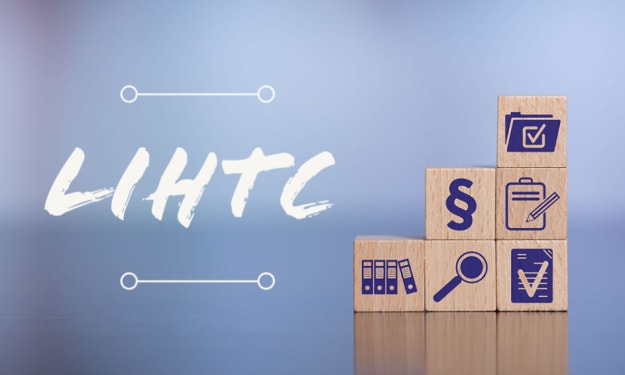Is Your WordPress Business Website Too Slow? Find out the Possible Reasons
A WordPress website may slow down due to unoptimized plugins, the absence of a content delivery network, and using older PHP versions. You can fix this issue by updating your website, optimizing the background processes, and splitting comments into pages.

A slow-loading website will not rank high in the SERP, thereby making you lose visitors. What it means is you will not be able to convert visitors into customers, which will, in turn, lead to less revenue. If you run a WordPress website, it’s important to determine the reason behind its slow speed. You can then take the necessary measures to ensure the success of your digital brand.
Do you run a small or medium-sized business? You must then capitalize on the digital domain to create brand awareness, attract potential customers, and expand your brand. You need a website to get things going, and WordPress is the right platform. Used by companies worldwide, this CMS platform has its share of benefits.
Despite these, a WordPress website can still slow down due to certain factors. We will know about them in this blog.
5 Reasons Why Your WordPress Business Website is Running Too Slow
It could be anything, from hosting problems to poor front-end optimization. In any case, they can cause your website to become slow and perform poorly. In this blog, I covered 7 reasons behind it. You will also learn about ways to fix your website problem effectively. Let’s check them out.
1. Unoptimized Plugins
If you are familiar with the WordPress ecosystem, you would know that plugins are one of its central components. Let me tell you something interesting - users can choose from 59,000+ plugins to design their WordPress website. In short, plugins help designers and developers create the best possible websites for their clients.
However, the problem is some of these plugins are poorly coded. These affect the performance of your website, preventing it from loading quickly. Installing these types of plugins can be devastating, as you won’t notice the aftereffects until your website traffic starts declining sharply.
Well, you can install multiple plugins without causing any damage to your site. Let me tell you how. You must get properly-coded plugins optimized for performance. Therefore, the right plugin selection will play a big role in ensuring the success of your WordPress website. In this case, you should take the help of a professional web design and development company. With their expert team by your side, you can be assured of a well-performing business website.
It doesn’t end here! There’s more to it. Keeping unused plugins can also reduce the speed of your website terribly. You can refrain from installing plugins if they aren’t absolutely necessary.
Delete all the unused ones and check your plugin collections daily to ensure you don’t have multiple plugins for the same purpose. Also, if you plan to replace a plugin, check and verify whether it is efficient, well-maintained, and reliable.
2. Unoptimized Images and Videos
Rendering images can lead to layout shifts. Moreover, a large-sized image tends to load slowly on a website. These tend to terribly hurt the Core Web Vitals and affect your website, degrading its quality. You wouldn’t want this to happen with your WordPress website, right? So, how does one optimize the images on their website without ruining their quality and performance? Let me explain.
Your selected image format also plays a big part in the performance of your website pages. You can opt for WebP, the image format most experts recommend. With a small size, it guarantees faster page speed and higher performance. The best part is there won’t be any major loss in image quality. You can reduce the image size by converting all images to the WebP format.
You can use image compression tools to compress the image file size for the best results. Thus, you will not compromise on quality anyhow. You can also use other tools like TinyPNG and JPEG Mini to reduce the file size and resize without losing quality.
Another way to ensure the website speed isn’t bogged down by unoptimized multimedia content is to serve images with content delivery networks. You can then witness faster delivery and smooth rendering. The best thing is you won’t compromise on website speed just for image quality.
3. Slow WordPress Themes
You absolutely need themes to define your site’s graphical interface. However, the saddest part is that they negatively affect the speed of your online platform and ruin the customer experience. You will find a lot of themes with wonderful user interfaces, but ultimately, slow down your website due to feature bloat. You surely wouldn’t want a beautiful user interface by compromising on speed!
It’s important to select the right theme for your website. To do so, start with listing down the requisite features. In case it’s a long list, carefully decide on what’s necessary and what’s not. This clarity will help you with your research. You can eventually decide on the themes that will help accomplish the purpose of your website.
Let’s now come to the integral question - how do you select a WordPress theme that doesn’t harm the performance of your website? The answer lies in checking the themes’ descriptions and functionalities. If you have an existing theme, ensure that you test it in a staging environment before proceeding with it.
There is something else that you need to prioritize - frequently update your theme for consistent and better performance. You must closely observe the activity of developers on the theme. If you believe using a particular theme increases page load times, conduct extensive testing.
You can also edit the styling approaches if it only renders vital CSS on the initial load. Delay the execution of unnecessary JavaScript. Also, ensure that you haven’t used numerous themes on your WordPress website and that there are just the necessary plugins. This is important as they consume a lot of space on your server, making your website load slowly.
4. Absence of Content Delivery Networks (CDNs)
A CDN helps you serve the same content to all users, irrespective of their geographical locations. Let me explain its utility further. Does your audience reside outside the US? You can then use a content delivery network to reach these prospective customers without compromising your website performance.
With a CDN system, you can make numerous versions of your website available on proxy servers. Your target audience can retrieve them from their nearest server. The absence of a CDN system can create problems for your users, as some of them won’t benefit from your website hosting’s speed.
5. Using Older PHP Versions
Are you using the latest PHP version for your server? If you aren’t, it may affect the speed of your WordPress business website terribly. It’s important to use an updated PHP version to counter the problems arising from redundant versions.
4 Ways to determine if your WordPress Website Is Slow
Is your WordPress website not loading quickly enough? There are several ways to be sure. Before contacting a custom web development company for help, check out some ways to identify the issue yourself. Let’s go through them below.
1. Use A Speed Testing Tool
Leverage a speed testing tool to figure out if you have to accelerate the speed of your WordPress website. Some of the notable ones include GTmetrix and Pingdom. It’s a relatively simple process. Just put your website’s URL into the search bar and let the tool do its job. It will analyze your website and recommend ways to enhance its performance.
2. Use an APM Tool
Application Performance Monitoring (APM) combines multiple tools to assess a site’s speed, user experience, and reliability. It is, thus, an excellent way to evaluate the speed of your WordPress site and determine whether it runs too slow.
Additionally, you can get more rounded information since the Application Performance Monitoring tool will conduct an in-depth examination of your website’s composition. The evaluation process varies widely, but you can get support in areas like API monitoring, end-user experience monitoring, etc.
By combining them, you can do something more than just track loading speeds - get a number of performance-related insights. You can then learn about the different potential operating problems. It allows you to understand their origins, like hosting problems or coding errors, enabling you to deal with them more efficiently.
3. Test Your Themes & Plugins
You can determine whether your WordPress website is slow by testing the themes and plugins you use. It gives you a clearer picture of the real cause of your slow-loading website.
Use a speed testing tool and check the speed of your website with every theme and plugin enabled. It helps you determine whether your site is really slow and whether it is due to those particular themes and plugins.
Having understood the issue, simply remove and clean those elements. You can also update them to see whether it solves the problem. Perform another test to check whether there has been an improvement in your WordPress website’s performance.
4. Use a Load Impact Tool
You also need to perform a stress test. Several consecutive speed tests provide you with a clear picture of the website speed. But the real test is how the website performs when there is high traffic. You can utilize the Load Impact tool and simulate multiple successive visits to your website over a span of five minutes. The best thing is you need not create an account to conduct a free test.
Now, let’s talk about the result. A graph will be displayed, where you can see the loading time for each user. If you see any significant spike in loading times (displayed by a blue line), it suggests your website has slowed down. It can also mean one of three things:
- Your web host can’t manage a large concurrent traffic
- You have a problematic hosting plan
- You haven’t optimized your website properly
If your hosting provider cannot handle a basic level of concurrent traffic, you need to integrate your website with a CDN to reduce the server load. Therefore, you can prevent a drop in performance during traffic surges.
3 Proven Ways to Fix a Slow-Loading WordPress Website
1. Update your Website
WordPress is a well-maintained open-source project. The best thing is it is updated frequently, with each update fixing bugs and security issues apart from offering new features. Additionally, there may be regular updates for the themes and plugins as well.
Being a WordPress website owner, you must always keep your site updated. This is important to ensure your website keeps performing well and doesn’t become vulnerable to security threats.
2. Optimize Background Processes
Check out some of the common background processes below:
- WordPress Backup plugin tasks
- Cron jobs to check for updates and publish posts
- Search engines trying to fetch content
Although some background tasks are harmless, others, like excessive crawling and backup plugins, can slow down your website. If you have backup plugins, ensure that they only run when there is less traffic on your website.
Additionally, adjust the frequency of backups. If you need backups more frequently, like in the case of real-time backups, then you can use a SaaS solution. For crawling, keep checking the crawl reports in Google Search Console. You can then identify the frequent crawls that end up in errors. These can slow down your WordPress website or make it responsive.
3. Split Comments into Pages
Do you get plenty of comments on your blog posts? Well, this indicates great engagement. However, loading all those comments can affect the speed of your website. Fortunately, WordPress offers a solution to this. Go to “Settings”, and then click on “Discussion”. Follow it up by checking the box next to the “Break comments into pages” section.
Conclusion
Although WordPress is a robust and flexible CMS platform, you must consistently evaluate and update it to ensure a better website performance and user experience. If you find it difficult or overwhelming, you can work with a web development company specializing in WordPress.
Their team will audit your online platform, determine its loading speed, and help you improve the performance of your website. As a result of their web development services, you can see better website performance, higher traffic, and engagement.
About the Creator
Jessica Bennett
Jessica is an individual contributor for various leading publications. Writing about technology, design and the latest innovations is her primary knack. She also works for Unified Infotech, a technology service provider serving startups.






Comments
There are no comments for this story
Be the first to respond and start the conversation.